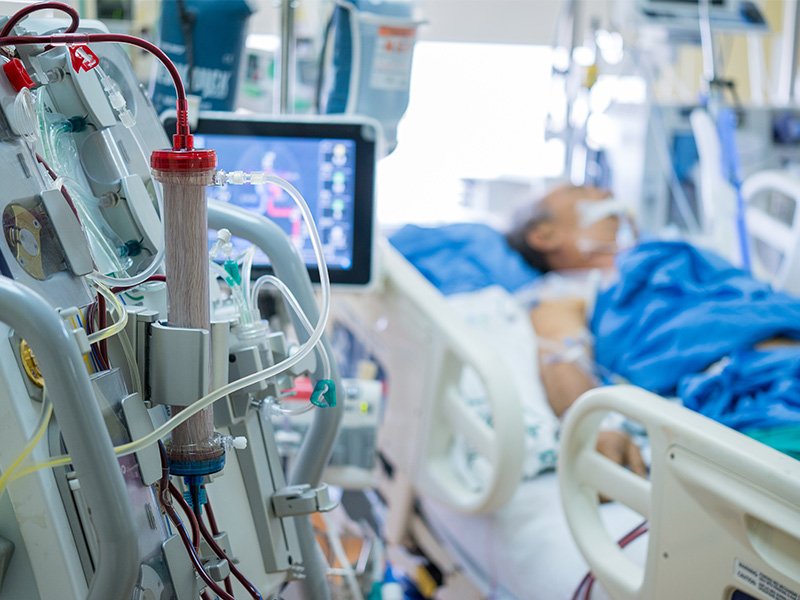What is kidney dialysis?
Renal failure affects how well your kidneys filter blood. The outcome is an accumulation of wastes and toxins in your bloodstream. Kidney dialysis will help your kidneys do their function of clearing excess fluid and waste from the blood. People with failing kidneys can receive therapy through dialysis.
Why do people need dialysis?
Kidney dialysis may be required for those with end-stage renal disease (ESRD) or kidney failure. Kidney injury can result from accidents and illnesses like diabetes, lupus, high blood pressure, etc.
Some people may develop kidney problems for unclear reasons. Kidney failure can develop gradually over time or quickly (acutely) due to a severe illness or accident. This sort of renal failure may disappear as you recover.
There are five stages to kidney disease progression. Medical professionals refer to end-stage renal disease (ESRD) or kidney failure as stage 5 kidney disease. The kidneys currently perform 10% to 15% of their usual duties. You might need dialysis or a kidney transplant to remain alive. Some people undergo dialysis while they are waiting for a transplant.
Types of dialysis
There are two types of dialysis
- Hemodialysis
- Peritoneal dialysis.
What is the meaning of hemodialysis?
Home hemodialysis is an option as well. In hemodialysis, blood is drawn from the body, cleaned in a device known as a dialyzer, and then returned to the body. You might decide to perform hemodialysis at home while you sleep at night. You may need shorter at-home therapy sessions four to seven times a week.
What is peritoneal dialysis?
Peritoneal dialysis filters blood through microscopic blood arteries located inside the peritoneum, which lines the inside of the abdominal cavity. This mixture of water, salt, and additional ingredients is a cleansing liquid.
Here is a simple explanation of what dialysis is:
You can live healthily with ESRD with the help of kidney dialysis.
- Regular tasks that your kidneys can no longer complete on their own can be completed by dialysis.
- Dialysis aids in maintaining the proper potassium, phosphorus, and salt levels in your body.
- Thanks to dialysis, you can live a full, active life even if you have kidney failure.
- Hemodialysis and peritoneal dialysis are the two forms of renal dialysis.
- Home dialysis is becoming increasingly popular since it can provide more flexibility and better results.
- The dialysis option that suits your demands in terms of lifestyle and health is the best choice for you.
- Many patients switch dialysis types during prolonged therapy to accommodate a changing lifestyle.
Risks associated with hemodialysis
Hemodialysis risks include:
- Low blood pressure
- Anemia, or a lack of sufficient red blood cells
- Muscular spasms
- Rouble sleeping
- Scratching
- High potassium levels in the blood
- Pericarditis is an inflammatory condition of the heart’s pericardium
- Sepsis
- Bacteraemia, or an infection of the bloodstream
- An unsteady heartbeat
- The most common cause of death for people receiving dialysis is sudden cardiac death.
Risks associated with peritoneal dialysis
An infection of the membrane lining the abdominal wall is peritonitis. For instance, a person may develop peritonitis after having a catheter implanted. An increased risk of infections at the catheter site in the abdominal cavity is linked to peritoneal dialysis.
Other risks consist of the following:
- Weakness in abdominal muscles
- Increased blood sugar brought on by the dialysate’s dextrose
- Gaining weight
- Hernia
- Fever
- Abdominal ache
While undergoing dialysis, let the dialysis clinic in Ahmedabad administering the procedure know if you experience these symptoms again.
How long does kidney dialysis take?
By filtering toxins, waste, and fluid from your blood through a semipermeable membranea substance that enables fluids and small particles to flow through it, but not larger particles dialysis serves as an artificial kidney. Hemodialysis and peritoneal dialysis use different techniques to remove toxins from your body.
The filtering membrane used in hemodialysis is known as a dialyzer and is located inside a dialysis machine. Before returning to your body, your blood circulates through the dialysis machine and gets cleaned. Blood never leaves your body during peritoneal dialysis because the filtering membrane is made of the peritoneum or lining of your belly. Both kinds of dialysis use a dialysate solution to remove unwanted material during the filtering stage.
The kidney is a crucial part of the human body. If you experience any problems, visit the best dialysis specialist doctor Dr. Ravi Bhadania in Ahmedabad for the necessary care. He is one of the most well-known nephrologists at Alfa Kidney Care Hospital! Alfa care hospital is the best dialysis center in Ahmedabad!! Book Your Appointment Today!
